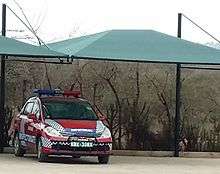Law enforcement in Kenya

There are a number of law enforcement organisations in Kenya, with the main organisation being the Kenya Police Service. Kenya employs up to 40,000 police and paramilitary personnel.
Police
The Kenya Police, which report to the Inspector-General of Police in the National Police Service, fields about 18,000 officers. The General Service Unit (GSU) has around 5,000 paramilitary personnel.
The regular police are backed up in rural areas by the Kenya Police Reserve (KPR) which is sometimes called the Kenya Home Guard. The Administration Police (AP), formerly the Tribal Police, report to the Inspector-General of Police in the National Police Service.
General Service Unit
The General Service Unit (GSU) initially known as the Kenya Police Emergency Company, was established by the colonial government to battle Mau Mau freedom fighters (rebels) during the fight for Kenya's independence.[1] It now has around 9,000 paramilitary of which 2,000 are trained by Israelis (Recce group) that forms most of the Presidential guard, VIP and Diplomatic protection.
Departmental law enforcement

The Administration Police (AP) 47,000 strong, report to the Deputy Inspector General- APS. The AP started out as the native police who reported to the local village headman.[2] In 1929 this was formalised by the Tribal Police Ordinance which also provided for their training under the oversight of the regional agents.[2]
The Kenya Wildlife Service (KWS) a state corporation paramilitary wing is responsible with wildlife conservation and general protection. It consists of the trap unit, air wing unit, anti-poaching unit, scout unit, wildlife intelligence unit, wildlife protection unit and of late dog unit. It is headed by the Director of the Kenya Wildlife Service. During Richard Leakey's tenure as director in the early 1990s poaching was almost eliminated, but gradually enforcement relaxed and poaching again became a problem with significant killings of endangered species beginning about 2001, especially affected were the black rhinos.[3]
The Kenya Forest Service (KFS) employs rangers to protect the forests and enforce revenue measures.[4] Among their duties the rangers enforce the eviction of squatters from the forests.[5]
Finally, the National Youth Service (NYS), which is administered by the Office of the President, provides some paramilitary training to young job trainees and numbers about 2,500. Other forces include the Kenya Prisons with about 16,000 personnel. However, due to the present economic situation, annual recruitment of new constables in all the military is not more than 2,000 personnel.
National Intelligence Service
National Intelligence Service (Kenya) (NIS) was previously known as the National Security Intelligence Service (NSIS) [6] which had its origins in "Special Branch" a department of the national police that was created in 1952 under the British administration.[7] Among other things it provided intelligence during the Mau Mau Uprising.[7] In 1963 with independence approaching Special Branch was made independent from the police and in 1969 it was given a new charter.[7] It wasn't until 1986 that it was transformed into the Directorate of Security Intelligence (DSI).[7]
In 1998, a new act of Parliament in Kenya established the National Security Intelligence Service (NSIS) to replace the former Directorate of Security Intelligence which at the time was still colloquially known as "Special Branch".[8] The first director general (DG) of the new service was retired Brigadier Wilson A.C. Boinett who served until 2006, when he was replaced with Major-General Michael Gichangi.[7] In January 2011 Gichangi was appointed to a second five-year term.[9]
NSIS's intelligence gathering work includes: internal, external and strategic intelligence. The NSIS is charged with identifying conditions that threaten Kenya's political, economic and social stability. It develops techniques and strategies to neutralise such threats. The NSIS director is the national security advisor to the president of Kenya.[7]
The NSIS was relocated from the notorious offices of Special Branch at Nyati House to new headquarters on the outskirts of the city, near the Windsor Golf and Country Hotel. In April 1999, the Moi government appointed Mrs Pamela Mboya, the former Permanent representative to the Habitat, to head a Committee that was charged with formulating a scheme of service for NSIS officers.
Security of tenure given the director general of NSIS is designed to protect him from such abuse by members of the governing elite. He has the opportunity to say 'no' to any unlawful or sectarian instructions from his bosses without fear of losing his job.
NSIS is divided into seven sections:
- 1. Administration under the director of administration,
- 2. Information technology under the director of information technology
- 3. Internal intelligence under the director of internal intelligence
- 4. External intelligence under the director of external intelligence
- 5. Analysis & production under the director of economic affairs
- 6. Operations under the director of operations
- 7. National Intelligence Academy under its own director
See also
References
- ↑ Sabar, Galia (2002). Church, State and Society in Kenya: from mediation to opposition, 1963–1993. London: Frank Cass. p. 181. ISBN 0-7146-5077-3.
- 1 2 "History of the Administration Police". 2010. Archived from the original on 11 July 2010.
- ↑ Blomfield, Adrian (8 December 2001). "Kenya fears threat to rhinos after killings". Daily Telegraph. London. Archived from the original on 19 November 2008.
- ↑ Mathu, Winston (5 July 2007). "Forest Law Enforcement and Governance in Kenya" (PDF). Kenya Forest Service (KFS) of the Ministry of Environment and Natural Resources.
- ↑ Njoroge, Karanja (10 November 2009). "Rangers to start Mau evictions as quit notice expires". Standard Digital. Nairobi, Kenya.
- ↑ http://www.standardmedia.co.ke/?articleID=2000059031&pageNo=3
- 1 2 3 4 5 6 "NSIS Historical Background". National Security Intelligence Service. 2006. Archived from the original on 22 December 2007.
- ↑ Njau, Mutegi (29 March 1999). "New intelligence body will be service oriented". Daily Nation. Nairobi, Kenya. Archived from the original on 18 May 2000.
- ↑ Leftie, Peter (23 September 2011). "Kenya: MPs to Vet Nominees for Spy Agency Top Job". Daily Nation. Nairobi, Kenya.
External links
- Kenya Police website
- Administration Police
- World Police Encyclopedia article on Kenyan police force
- Kenya National Security Intelligence Service
